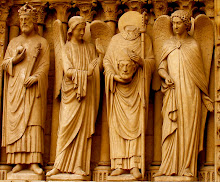I have always found the humanity of Christ fascinating.
I do not often use the word fascinating , so when I use it you know I mean it. Why is it fascinating?
Because Jesus was the most unique human individual to ever cross the horizon of this world. Why? Well obviously, because he was fully divine yet fully human. This is one of the great fascinating mysteries of God. How could an individual be both God and man? The easy answer is that in fact he was not both God and man, but simply a very good man.
But this doesn't really work. Jesus said he was God, therefore if he claimed divinity and was lying then he was not a very good man, either. Or he was insane. As CS Lewis once put it, Christ is either Lord, a liar, or a lunatic.
When I was a child, I came to the conclusion that Jesus was basically God wrapped in a human body. But that doesn't really work either.
Because if that were true, than Jesus would not have been fully human, he would only have had a human body. But time and again we see Jesus displaying a remarkable degree of human emotion and feeling.
Now of course, it should be understood that God, being the designer of our emotions, also has emotions and indeed experiences them in a much more nuanced and profound manner than that in which we do.
But it seems evident to me that Jesus experienced emotions in a very human way. But these experiences were only possible because during his time on earth Jesus Christ was not omniscient, or at least not all the time.
The most concrete evidence for this rests on Jesus' statement that he had no idea when the world would end, and that only the Father did. But there are other examples strewn throughout the Gospels that indicate Jesus' semi-omniscience. In Luke's Gospel, we find Jesus praying in Gethsemane that this cup of wrath would pass from him.
And he is praying desperately.
So desperately, in fact, that he sweat blood. When in all of Scripture do we observe the Lord God experiencing desperation? Well, never. Except for the Gospels. Desperation is contingent upon not knowing. Uncertainty.
Later on, we find Jesus being desperate again, in one of the most emotionally charged passages of holy writ. As he hangs dying on the cross, Jesus famously screams, "My God, my God! Why have you forsaken me?!"
Honestly, this is one of the single most fascinating scenes in the Bible. Christ is directly quoting Psalm 22, originally penned by a young David yearning for God's presence in his life. It is quite likely that Jesus read through the Psalter as often as he could, and it may very well have been his favorite book of the Hebrew Scripture. Principally because prophesies of his life and doings are all over the Psalms, but also because Jesus very much identified with King David.
But that's not why I think Jesus' wrenching cry is so intriguing. For that we must consider the Trinity; or at least try to, since by definition we cannot.
The one phrase with which I think we can almost adequately use to describe the tri-personal God-head is loving community. God the Father, burning and spinning and shining forth like the thermonuclear core of a supernova. God the Son, the generative and conductive force of the universe, sustaining and edifying life. God the Holy Spirit, fluid and aflame, suffusing the planet earth with the love of God and gently tugging our hearts toward Him. These three distinct and unique persons are three yet one, different yet all the same.
This is another one of the great fascinating mysteries of God. The point is that these beings have always existed together and in perfect union with one another. What does this have to do with Jesus' cry? Think about it. We say Jesus died for our sins, which is a quaint thing to say in Sunday School but in practice was extremely brutal. And part of his atonement act was to take all sin upon himself and drape his cloak of righteousness over us all. But in the act of taking upon our sin, Jesus broke with the perfect union of the Triune God.
As we have discussed before, God is holy. That is what makes sin evil. God cannot be in relationship with sin. And when Jesus cried out, he had become sin, and God turned away from him. And for the first time in eternity Christ knew what it was to be totally alone.
The point of all this is that Jesus was a man. In a later post we'll discuss his development as a human being and consider the implications of that on his deity. But suffice it to say that Jesus was not omniscient whilst here.
